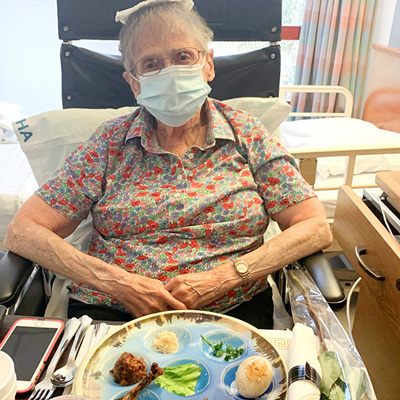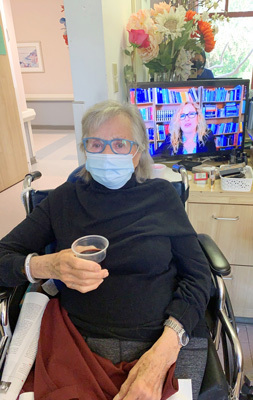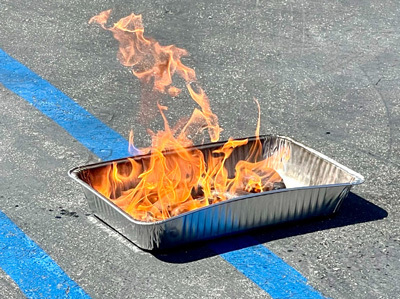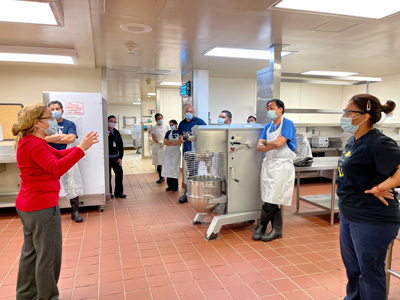The Promise of Passover at the Los Angeles Jewish Home


The Promise of Passover at the Los Angeles Jewish Home

Passover is always one of the most important holidays on the Jewish calendar, and for seniors at the Los Angeles Jewish Home, this year's celebration was something extra special.
"During Pesach, we tell the story of our People's liberation from slavery in Mitzrayim [Egypt]. This year, it coincided with the anniversary of our own journey through COVID-19," says Skirball Director of Jewish Life Rabbi Karen Bender. "Just like Mitzrayim, COVID has been a dangerous and confining place. And though we're still not quite through the pandemic, things are starting to open back up, the same way the waters parted for the Jewish people at the Red Sea."
This Passover was a particularly meaningful time for Jewish Home residents, who endured long months of uncertainty as the coronavirus swept across Southern California. Here, Rabbi Bender points out another parallel between the Exodus and modern day.

"Ultimately, Passover is a joyful holiday, and right now at the Jewish Home, we are also feeling a sense of real joy," she says. "Our ancestors knew what it meant, after great struggle, to strive toward the Promised Land. Now, we too, can finally see it emerging in the distance. That is cause for optimism and celebration."
To mark the occasion, Rabbi Bender spent the holiday doing something she had not been able to do for 12 months: gathering in person with Jewish Home residents—in small groups—to teach about Passover and to give the Home's seniors a chance to reconnect.
"To be extra cautious, we kept residents in their cohorts and I visited each floor of our buildings to help people study the Haggadah," she says. "It's such a rich and interesting text— you could easily teach a four-semester course at the college level about it!"
The experience, she says, was incredibly moving. "We began class by saying a Shecheheyanu prayer, expressing our thanks for being together again," she says. "Seeing people's relief and excitement was just amazing."

Rabbi Bender and her colleague, Eisenberg Village Campus Rabbi Ronald Goldberg, helped residents observe the holiday in other ways, as well. Since large group gatherings have not yet been deemed safe, the rabbis broadcast a seder, the traditional Passover meal, on the Jewish Home's closed circuit TV station.
"We made sure there was a seder plate in every hand, which meant distributing nearly 1,000 of them to our residents," Rabbi Bender says. "As they watched the seder, they were able to participate along with us—dipping parsley in salt water, making the Hillel sandwich and singing the Four Questions."
In preparation for the holiday, Rabbi Bender also led other Passover rituals. "This year, I was able to burn the hametz [leavened products], which to me was another sign that we're starting to return to normal," she says. "In addition, we had a massive cleaning of the Jewish Home's kitchens. Our mashgiach [an authority who supervises the kashrut status of a kosher establishment] says no other organization he's ever worked with is as skilled or dedicated to koshering for Pesach. It's an amazing sight to see."

After such a challenging year, Rabbi Bender was thrilled to see life at the Jewish Home start to resume a more regular pace. "We're going from holy to holy—transitioning from the holiness of protecting our residents and making the sacrifices needed to stay safe, to the holiness of taking tiny steps toward leading a more normal life," she says. "To see residents once again greet each other in person and wish one another a 'Zissen Pesach,' a sweet Passover, was an unbelievably heartwarming experience."